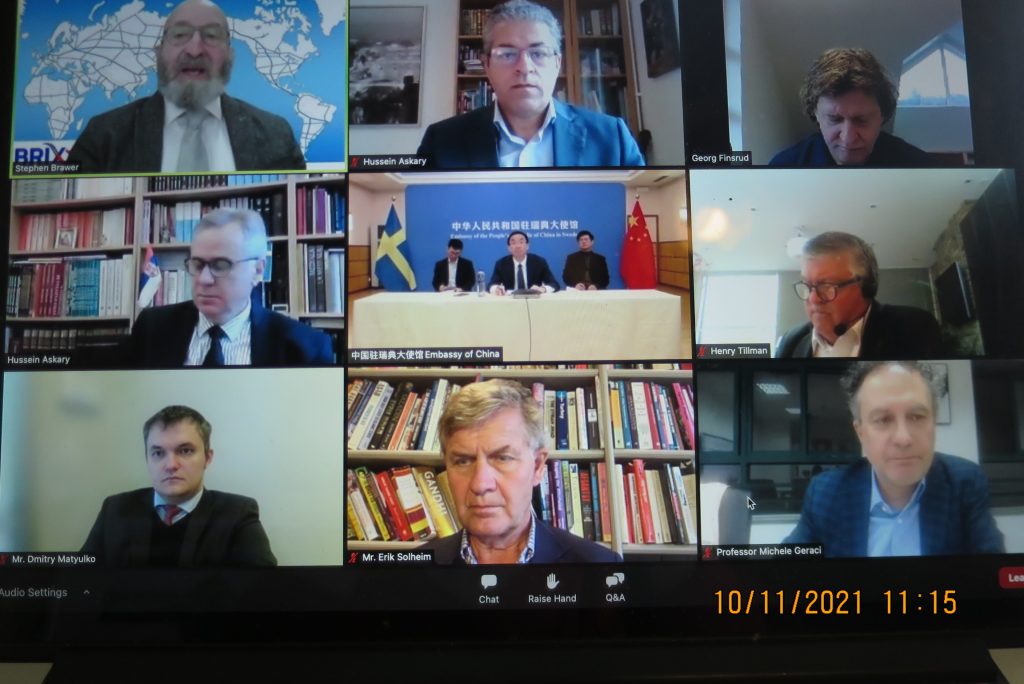By Xuefei Chen Axelsson
Stockholm, Nov.11(ChinaEuropeDialogue CED) — Green Silk and Road Webinar was held on Wednesday with the presence of the Chinese Charge d’affairs Zhang Biao at the Chinese Embassy to Sweden and experts from Sweden, Norway, Britain and Italy, Serbia, Belarus and China.

Zhang Biao made the opening speech.
“Earth is mankind’s only home, and green and sustainable development is the trend. For a long time, people found it hard to keep the environment and economic growth both at once.” said Zhang.
“We believe “green mountains are gold mountains”, and environmental protection and economic growth are mutually inclusive instead of exclusive. A well-preserved environment is valuable both ecologically and economically, which bears on the potential and stamina of economic growth. One tested-and-trusted way is to use the nature to develop “industries with regional characteristics” and promote environmentally friendly economic growth. We may also fully mobilize economic factors such as land, workforce, assets and nature through reform and innovation, to turn green mountains into gold mountains by unleashing their ecological value. In this sense, a green and low-carbon economic system that promotes a society-wide green transformation is the path to long-term sustainability.” said Zhang.
He also pointed out that Sweden has rich experience in green development, and is home to a large number of innovative companies, both start-ups and big names. They provide cutting-edge technologies and solutions in areas of environmental protection, renewable energy, bio-city, environment engineering, garbage-converted energy, industrial and construction energy conservation, bio-fuel and wind power. China has a huge demand for green industries. It is predicted China’s green industry will be worth 23 trillion RMB yuan or USD 3.6 trillion in 2030, and China’s green financial market will grow to 100 trillion RMB yuan or USD 15.6 trillion in 2060.
“China is willing to work with all other countries including Sweden on the basis of mutual respect and equality, and promote green development through innovation. China is also willing to actively expand practical cooperation on the bilateral level and with BRI countries, to energize green development in China, Sweden and elsewhere, and make contributions to the green cause of the world.” concluded Zhang.
The webinar was presided over by Stefan Brawer, Vice Chairman of BRIX.
“A clean environment, economic prosperity and human rights are usually treated as separate issues. The BRI can show that these matters are intertwined and elements of one method of developing a society to moderate prosperity, as well as living in peace and harmony both with its neighbours and among nations worldwide. There are still major disagreements between the views expressed by certain governments and institutions in the West especially and those of developing nations who are arguing that for them to rapidly escape poverty and enter an era of development depends on certain reliance on the use of fossil fuels, especially on “clean coal” power plants. The webinar will explore these matters too.” said Brawer.

Serbian Ambassador to Sweden Dragan Moncilovic made a presentation about his view of green silk and road initiative and Serbian China relations.
“Serbian attracts a lot of foreign investment including those in green projects. We like to balance our political relations with all countries. Our relations between Serbia and China are excellent. We are in the process to join the European Union, but we still have space not only to cooperate with China but also with the United States and Russia, with all economic partner who is interested in invest in my country. And that is why we are very proud with China. We have trade with China for 3 billion euro per year. We have very good political relations with China and we recognize the one China policy and China’s point of view about Serbian territory we also appreciated. ” said Ambassador Moncilovic.
“China involved in Serbia’s steel and mining industry a lot. It was a steel company that the US left and thanks to the Chinese company, the company continues in accordance with environmental standards. Chinese companies not only build highways and brides, they are building railways working together with Serbian companies. They are also going to build metro in Belgrade. Chinese companies currently employ about 10 thousand people working in Serbia while the German companies employ 50 thousand workers from Serbia.” said Ambassador Moncilovic who is proud to use the bridge built by Chinese companies in Serbia.
“Today I heard BBC broadcast that China is expanding electric cars and batteries and I am very happy about the news because it will be good for the environment and climate.” said Ambassador Moncilovic.
Achieving the common aims of mankind and creating “a community for shared future for mankind” must now be embraced for development in both the East and West, as well as the North and South. A clean and sustainable environment means a developing economy, one that includes industrialization and modernization, and one that successfully eliminates absolute poverty worldwide. As this was well expressed by President Xi in April of 2021, “climate issues should not be taken over by geopolitical objectives”, and that it is through scientific and technological progress and innovation will China reduce its emissions without compromising the transition of its entire population from a society of moderate prosperity in 2021, to a fully prosperous society in 2049.
China has recently issued a white paper, entitled “Moderate Prosperity in All Respects: Another Milestone Achieved in China’s Human Rights”, unveiling how its route to all-round moderate prosperity, coincided with comprehensive progress in human rights. The white paper correctly calls poverty the biggest obstacle to human rights. This is a lesson that the Belt and Road Institute in Sweden (BRIX) will highlight in the coming webinar. No policy that blocks the improvement of living conditions and general productivity for people of sovereign nations, for example through sanctions, is acceptable. No rhetoric that hails democracy, and freedom, without providing for the physical well-being of the people is worth very much. The recent case of Afghanistan should be a strong reminder of this kind of discrepancy, where trillions of dollars were spent fighting terrorism, promoting Democracy, but the country was kept in abject poverty.
The continuation of global development through the Belt and Road Initiative (BRI) is the challenge and the direction that addresses this necessity. The BRIX has and will continue to promote the benefits for Sweden and for the nations of Europe to join and cooperate with the BRI. In addition to the 140 nations, that have already chosen to work with China to jointly build the BRI, the Belt and Road Institute in Sweden will continue to document such benefits of such cooperation, despite the ongoing disinformation campaign, actively painting China in an extremely negative light.
A clean environment, economic prosperity and human rights are usually treated as separate issues. The BRI can show that these matters are intertwined and elements of one method of developing a society to moderate prosperity, as well as living in peace and harmony both with its neighbours and among nations worldwide.
There are still major disagreements between the views expressed by certain governments and institutions in the West especially and those of developing nations who are arguing that for them to rapidly escape poverty and enter an era of development depends on certain reliance on the use of fossil fuels, especially on “clean coal” power plants. The webinar will explore these matters too。
Mr. Dmitry Matyulko, Charge d’Affaires Embassy of Belarus to Sweden also made a presentation about how China helped build an industrial park which attracted a lot of companies from many countries to work there.

Erik Solheim Former Norwegian Member of Parliament, Former UN Under Secretary General and former Executive Director of the UN Environmental Program spoke highly of Belt and Road Initiative especially in green technologies.
“China is a leading country and leads in green technologies almost in every aspect. ” said Solheim.
Professor Michele Geraci Former Undersecretary of State at the Italian Ministry of Economic Development pointed out that countries especially the US and the EU should not pick fingers to other countries for this or that, but try to cooperate in BRI projects.
Henry Tillman, Founder and Chairman of the China Investment Research gave a series of numbers about how much each country emit during the industrialization.
Georg Finsrud, CTO, Scanwater Technology, System Integrator at SIEU Green introduced his clean technology for waste water treatment.
Hussein Askary Member of the Board for the Belt and Road Institute in Sweden gave a speech about Belt and Road and Africa illustrating how BRO projects benefits Africans through this technology.
Stefan Brawer not only talked about Xi Jinping and his ideas about green Silk Road initiative and his philasophical thoughts.
The panelists also answered questions.


